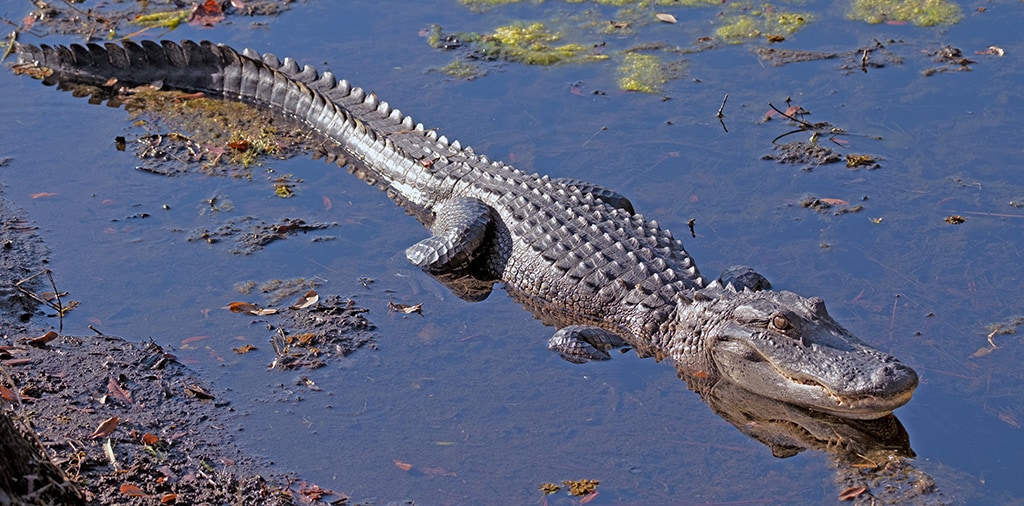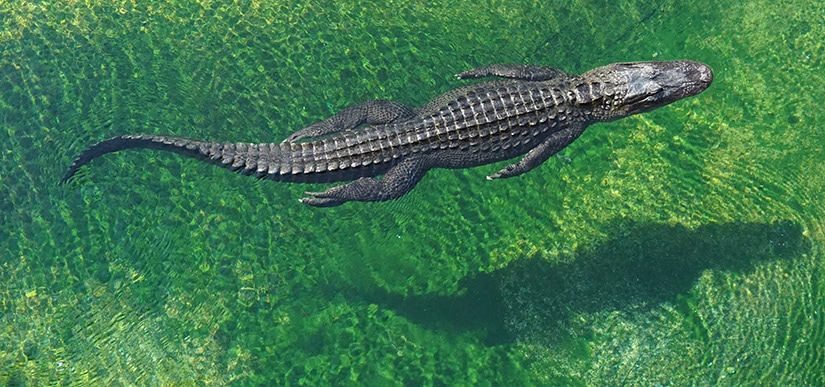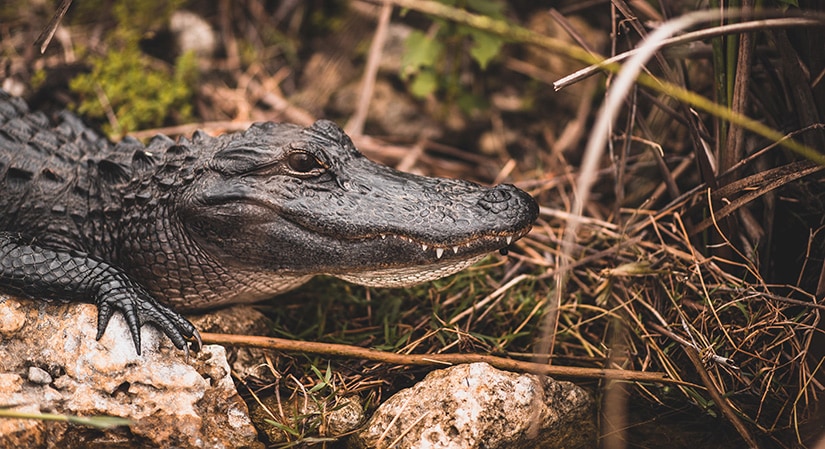Stand up paddle boarding is a relaxing and generally safe activity. Of course, there are a few risks involved, since it’s a water activity, and those are easy to avoid with the necessary precautions.
But when it comes to wildlife, things can get a little tricky, especially with scary animals like alligators. Can you imagine suddenly seeing an alligator swimming next to you while you’re paddling? That would be frightening.
No paddler hopes to be paddle boarding with alligators, but it can happen, depending on where you live.
SUPing with gators is safe, as long as you respect them and their natural habitat. If you can’t completely avoid waterways with the reptiles, here is everything you need to know about paddling safely with them.
Which Areas Have Alligators?
Luckily for most paddle boarders, alligators are only native to China, Mexico, and the United States. If you live anywhere else in the world you have nothing to worry about–as far as gators are concerned.
Even in the United States, your chances of coming across an alligator are low, unless you paddle board in the southeast states. Florida and Louisiana have the highest alligator population–surpassing two million in the two states.
Other parts where you may see alligators include the southern areas of Arkansas, Mississippi, Georgia, and Alabama, the coastal areas of the Carolinas, as well as some parts of Texas and Oklahoma.
Is It Common for Alligators to Attack Paddle Boards?
Alligators don’t go around looking for paddle boards to attack. So no, it isn’t common for alligators to attack paddle boarders.
However, an attack can still happen. In September 2021, a gator almost attacked a woman on a SUP at Silver Springs State Park. The animal came dangerously close and even tried to bite off the woman’s paddle board.
Experts believe that people had been feeding the alligator and it associated paddlers with food, making it very dangerous. (The reptile was later euthanized).
Other than this frightening Florida Spring event, it’s hard to find reports of other gator attacks on paddle boarders. On average, alligators only kill one person per year so it’s safe to say that humans aren’t exactly their target.
How to Know Whether There Are Alligators Nearby
If you paddle board in a location where there may be alligators, you should always be on the lookout as you don’t want to be caught by surprise.
The reptiles can be a little shy and elusive but there are a few signs that could help you know whether there’s one or two around.
Alligators will often sunbathe for warmth since they’re cold-blooded. Observe the vegetation along the water’s edge. You may notice that the vegetation has been disturbed and there’s what may look like a path or sliding mark.
Gators typically use the same path to get out and re-enter the water; since they’re heavy, they’ll usually leave a mark.
Another very obvious sign is a hissing sound. An alligator will hiss before attacking when it feels threatened. You may have gotten too close to its territory unaware. So when you hear a hissing sound, paddle away swiftly.
Lastly, alligators make a certain sound during mating season. It’s a loud bellow that’s hard to miss. If you hear it, don’t go any closer and it’s best to get out of the water.
What to Do When Paddle Boarding An Area with Alligators
As mentioned above, paddle boarding with alligators isn’t necessarily dangerous and people do it more often than you may think.
Here is what you need to do to ensure your safety.
1. Be Aware of Your Surroundings
Stay alert and keep your eyes peeled for any signs of an alligator in the water. Don’t be absent-minded as you could unknowingly get too close to one and make it feel cornered.
2. Stay Away from the Shoreline
Gators usually sunbathe on river banks or the shore of a lake. When they see you, they’ll probably rush to enter the water and hide.
If you’re too close to the edge where they are, they could knock you off your paddle board. Trust me when I say you don’t want to be in the water with frightened reptiles. You may end up in the local stories or even national news.
Check the video below to understand what I mean.
3. Try to Relax If You See an Alligator
Gators won’t bother you and they will most likely try to get away from you. They typically feed on fish, turtles, and other small mammals–not humans.
So if you see one, don’t be scared. Paddle away and go on with your paddling session. Avoid panicking and making sudden moves as you may fall into the water. And that won’t be good.
4. Don’t Get Any Closer
This is a rule you should follow with pretty much all wild animals. Remember that you are in their home, not the other way round.
If you get too close, an alligator may consider you a threat and attack. You don’t want that.
You also shouldn’t feed gators as they will start to associate paddlers with food. According to the Florida Fish and Wildlife Conservation Commission, they’ll start to lose their fear of people, which is dangerous.
5. Paddle Away Swiftly
Paddle away from alligators, not towards them. If you encounter an alligator while paddle boarding, the best thing to do is paddle away calmly and quickly.
How to Avoid Alligators
While SUPing with gators can be safe, avoiding them is even safer and the best option.
a. Stick to Places with High Boat Traffic
Alligators will generally stay away from areas with high human and boat traffic. A place like this may not be ideal for paddle boarding–boats zooming past you isn’t exactly fun–but it’s safe.
b. Don’t SUP in Areas with Alligators
To avoid trouble of any kind, it is best to completely stay away from waterways with gators.
Alligators are mainly freshwater animals and they can only tolerate salt water for a short while. So maybe stick to ocean paddling if you live in an area with a lot of gators.
Wrapping Up
Paddle boarding with alligators can be safe. If you respect them and their natural habitat, nobody will get attacked.
These gators don’t go around looking to purposely attack paddle boarders or humans in general. So learn how to spot them; and when you do, keep your distance. Avoid murky water, always be alert, and stay away from the shore. It’s also better to go SUPing with friends if you expect to encounter alligators – but rest assured that an encounter is somewhat unlikely.



